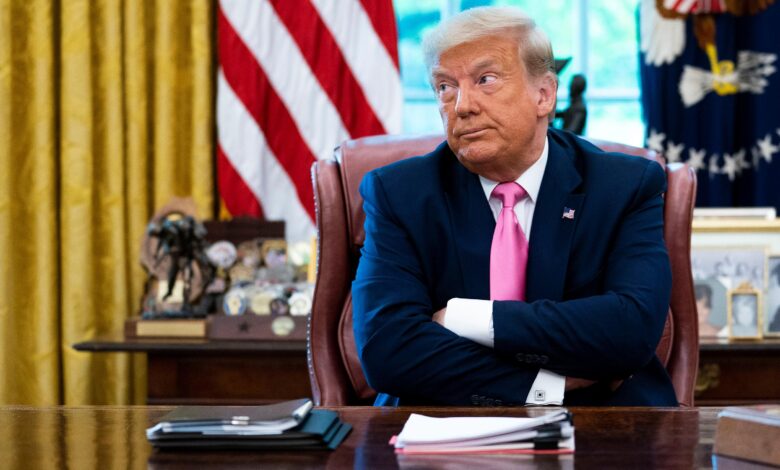Trump Lies: The Truth Behind His Most Controversial Statements

Donald Trump, the 45th President of the United States, is no stranger to controversy. His time in office was marked by bold statements and claims that often left many scratching their heads. Whether it was during rallies or on social media, Trump had a knack for making headlines with assertions that sometimes stretched the truth—or outright defied it.
From crowd sizes at his inauguration to allegations of widespread voter fraud, Trump’s penchant for exaggeration and misinformation has sparked countless debates. As a polarizing figure in American politics, understanding the facts behind his most contentious statements helps illuminate not just his narrative but also its impact on public perception and policy.
Join us as we dig deeper into some of Trump’s most notable lies—unpacking them one by one to reveal what’s fact and what’s fiction. This exploration isn’t just about holding a politician accountable; it’s about empowering voters with knowledge in an era where information can be easily distorted. Let’s get started!
Analyzing Trump’s Claims About the Size of His Inauguration Crowd
When Donald Trump took office in January 2017, he made headlines for his assertions about the size of his inauguration crowd. He claimed it was “the largest audience to witness an inauguration” in history.
However, photographs and reports from that day told a different story. Comparisons with past inaugurations showed noticeably fewer people attended Trump’s swearing-in ceremony than Barack Obama’s in 2009.
The dispute over crowd size escalated quickly, leading to heated exchanges between officials and media outlets. White House Press Secretary Sean Spicer even insisted on the “alternative facts” regarding attendance numbers.
This claim became emblematic of Trump’s relationship with the truth—raising questions about credibility and accountability during his presidency. The obsession with crowd sizes seemed trivial but revealed deeper issues concerning perception versus reality within political discourse.
The Truth Behind Trump’s Claim of Voter Fraud in the 2016 Election
Trump’s claim of widespread voter fraud during the 2016 election stirred significant controversy. He asserted that millions voted illegally, a statement that sent shockwaves across the political landscape.
Several investigations followed his claims, yet no substantial evidence emerged to support them. Election officials from both parties consistently affirmed the integrity of the electoral process. They confirmed that cases of fraud are exceedingly rare in U.
S. elections.
Moreover, Trump’s own commission on voter fraud disbanded without finding any proof to back his allegations. This lack of evidence raised questions about transparency and trust in our democratic system.
The ripple effects continue today, as these unfounded assertions have fueled ongoing debates about voting rights and access to polls. It’s clear that misinformation can deeply affect public perception and sow discord among citizens.
Investigating Trump’s Statements on Immigration and Border Security
Trump’s statements on immigration and border security have sparked intense debate. He often claimed that a wall would completely stop illegal crossings. Yet, experts point out barriers alone can’t solve complex issues like asylum-seeking.
The former president frequently referred to immigrants as criminals and threats to national safety. However, studies show immigrants contribute positively to communities and economies across the country.
Additionally, Trump argued that sanctuary cities exacerbate crime rates. Research contradicts this narrative, revealing lower crime rates in these areas compared to others.
His administration also enacted policies like family separation at the border—an approach criticized for its humane implications. The impact of such actions remains profound for many families torn apart during those years.
By scrutinizing Trump’s rhetoric, it becomes clear that his claims often lack solid grounding in reality or data-driven evidence. Real conversations about immigration need nuance beyond political soundbites.
Fact-Checking Trump’s Claims About the Economy and Job Growth
Trump often touted his economic achievements during his presidency, claiming record-high job growth and a booming economy. However, analysts have scrutinized these claims closely.
Before Trump took office, the economy was already on an upward trajectory. Job growth had been steady under the previous administration, making it challenging to attribute all progress solely to Trump’s policies.
Furthermore, while unemployment rates did drop significantly during his term, some experts argue that this was largely due to trends set in motion long before he entered office.
The tax cuts implemented by Trump aimed at stimulating growth but also resulted in increased national debt. Critics pointed out that benefits primarily went to corporations rather than average workers.
Economic indicators can be complex and multifaceted. Simplifying them doesn’t provide a complete picture of success or failure—it’s essential to dig deeper for accurate assessments of any administration’s impact on the economy.
Examining Trump’s Controversial Statements on Climate Change and Environmental Policies
Trump’s approach to climate change has been a source of contention. He often dismisses scientific consensus, calling it a hoax or exaggeration. This rhetoric resonates with his base but undermines serious discussions about environmental issues.
His administration rolled back numerous regulations aimed at curbing emissions and protecting natural resources. For instance, the withdrawal from the Paris Agreement sent shockwaves across global communities committed to fighting climate change.
When discussing renewable energy, Trump has frequently touted coal as a solution, despite overwhelming evidence suggesting that fossil fuels contribute significantly to environmental degradation.
Critics argue that these statements reflect ignorance rather than policy choices grounded in science. The implications of such beliefs extend far beyond politics; they threaten future generations’ ability to thrive in an increasingly unstable climate. Disregarding expert advice could have dire consequences for both ecosystems and public health moving forward.
Impact of Trump’s Lies on the Public and
The impact of Trump’s lies on the public has been profound and multifaceted. His statements have not only shaped political discourse but also influenced perceptions among his supporters and detractors alike.
Many Americans now find themselves questioning the credibility of politicians and institutions. When a leader frequently bends the truth, it creates a culture where misinformation can flourish. This distortion affects how people consume news, often leading to polarized viewpoints that are hard to reconcile.
Trump’s claims about issues like immigration or voter fraud have heightened fears and anxieties among various communities. For some, these narratives validate their concerns; for others, they incite anger or distrust in governmental processes. The ripple effects of such rhetoric extend into local communities as well, shaping discussions around policy and governance at all levels.
Moreover, Trump’s approach has emboldened some individuals to express more extreme views publicly. It has created an environment where lying seems acceptable if it serves one’s agenda—a troubling precedent for future leaders.
As we navigate this landscape shaped by “Trump lies,” critical thinking becomes essential for citizens seeking accurate information. Engaging with facts rather than rhetoric is crucial in fostering informed dialogue within our democracy—one that prioritizes transparency over deception.



